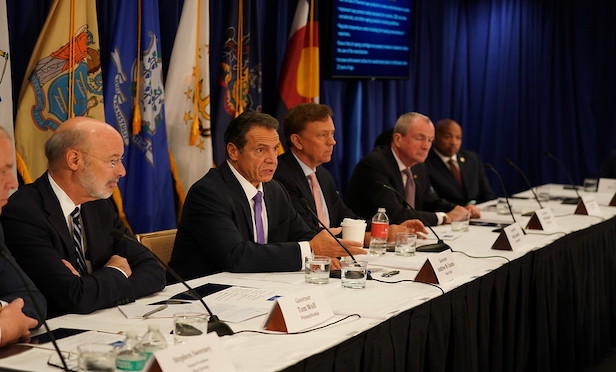 From left, Pennsylvania Gov. Tom Wolf, New York Gov. Andrew Cuomo, Connecticut Gov. Ned Lamont and New Jersey Gov. Phil Murphy
From left, Pennsylvania Gov. Tom Wolf, New York Gov. Andrew Cuomo, Connecticut Gov. Ned Lamont and New Jersey Gov. Phil Murphy
NEW YORK CITY—The governors of New Jersey, New York, Connecticut, Pennsylvania huddled on Thursday for the first Cannabis Regulation and Vaping Summit to get a handle on how the states can formulate policies and regulate cannabis and vaping.
The governors were joined by legislative leaders and officials from New York, Rhode Island, Massachusetts, Pennsylvania and Connecticut at the session held in Manhattan and discussed a collaborative joint regional approach to cannabis and vaping legislation and policies. Following the summit, the governors reached a set of core principles on issues related to market regulation and empowerment; public health; public safety and enforcement and vaping best practices.
New Jersey Gov. Phil Murphy said, "In New Jersey, we are committed to conquering the public health challenge of vaping and advancing marijuana legislation. These actions will be strengthened and magnified when we know there is a similar strategic approach in New York, Connecticut, Pennsylvania, and other states. Our impact is much greater when we break out of our own silos as individual states and collaborate on the tough issues plaguing our region and nation."
New York Gov. Andrew Cuomo said, "This issue is complicated, controversial and consequential. It is probably one of the most challenging I've had to address in New York, and it's a challenge for all the states. The goal of this summit is to collaborate with one another, share resources and think collectively as we all try to figure this out."
Connecticut Gov. Ned Lamont said, "Cooperating as a coalition of states on these issues is the best path forward—as we not only share borders, but we share economic interests, public health priorities, and a joint understanding that the more states that work together on these kinds of issues, the better the policy results will be for our residents."
Pennsylvania Gov. Tom Wolf said, "It's imperative that we focus on bringing the conversation about cannabis into the open and making sure there is proper regulation. When we establish a marketplace for cannabis, social justice and empowerment initiatives must be considered. The discussion today with my fellow governors resulted in meaningful agreements and can open the door for passage of sensible reforms."
All states have agreed to a series of principles to setting a cannabis tax structure, as well as best practices to ensure that disproportionally impacted communities from the war on drugs have access to the new industry .Among the guidelines agreed to by the governors include: identifying best practices with regard to the basis for taxation, implementation stages and dynamic market-based controls for cannabis production and cultivation; supporting the market architecture of cannabis regulation, including a keen awareness of the need to ensure a fair and competitive market, deploying strategies such as a limitation on the number of licenses or licenses types, to protect against manipulation of markets encouraging in conjunction with their legislature a stable regional market by identifying and implementing a similar overall effective tax rate for cannabis products and incorporating tax mechanisms, such as weight based, potency based, and/or mg/thc based, to ensure price stability for licensees and that the price of cannabis does not fall to a point that increases access and use beyond current usage rates.
The states also agreed to stricter public health actions and enforcement in terms of the cannabis and e-cigarettes (vaping) industries.
The states will use the following guidelines in terms of vaping: banning or regulating the sale of flavored vape products to reduce the product's attractiveness to youth; implementing vape product safety standards for nicotine, CBD and other cannabinoids, and other vaping products including diluents, excipients, cutting agents, and other additives; regulating temperature control, including the heating mechanisms of vaporizers; ensuring all vaping cartridges are properly marked or labeled to inform the user of the manufacturer; increasing enforcement actions for unauthorized sales to individuals under 21 years of age and restricting advertisements to ensure products are not targeted to minors.
© 2025 ALM Global, LLC, All Rights Reserved. Request academic re-use from www.copyright.com. All other uses, submit a request to [email protected]. For more information visit Asset & Logo Licensing.








